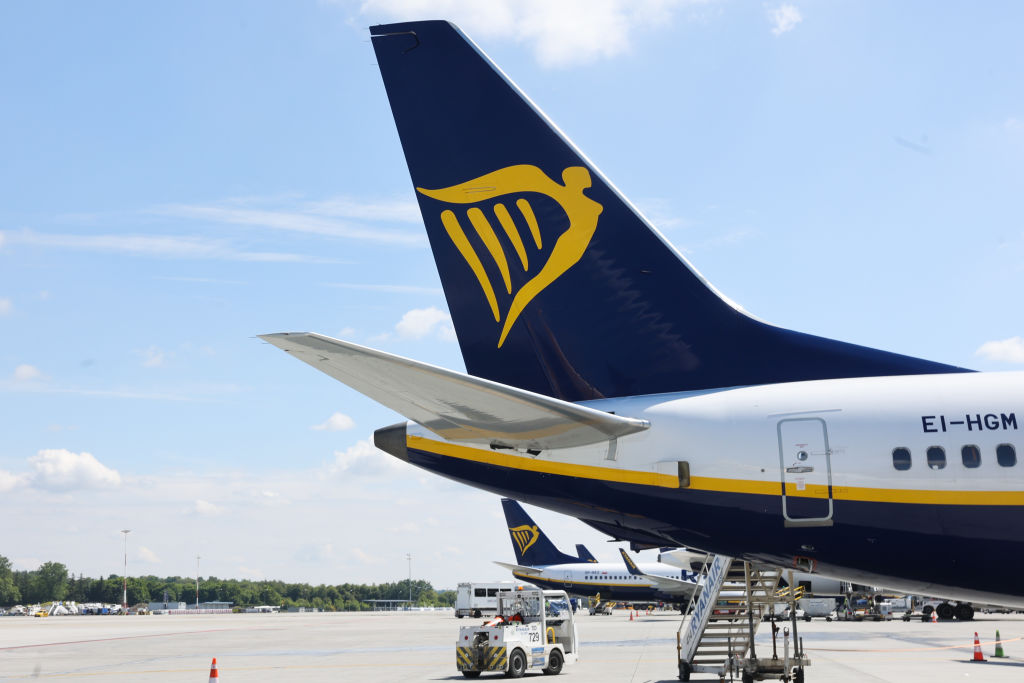Ryanair profits plummet by almost half – should you invest in airline stocks?
Airfares have fallen in recent months, impacting profits. Should you invest in airline stocks this summer season?


Get the latest financial news, insights and expert analysis from our award-winning MoneyWeek team, to help you understand what really matters when it comes to your finances.
You are now subscribed
Your newsletter sign-up was successful
Want to add more newsletters?

Twice daily
MoneyWeek
Get the latest financial news, insights and expert analysis from our award-winning MoneyWeek team, to help you understand what really matters when it comes to your finances.

Four times a week
Look After My Bills
Sign up to our free money-saving newsletter, filled with the latest news and expert advice to help you find the best tips and deals for managing your bills. Start saving today!
Budget airline Ryanair saw its first-quarter profits plummet to €360 million, it revealed today (22 July) – 46% lower than the same period a year ago.
An early Easter was partly to blame, with half of the holiday period falling into the previous quarter.
The airline said its traffic was up 10%, but that airfares were weaker than expected. Customers enjoyed savings of around 15% over the period.
MoneyWeek
Subscribe to MoneyWeek today and get your first six magazine issues absolutely FREE

Sign up to Money Morning
Don't miss the latest investment and personal finances news, market analysis, plus money-saving tips with our free twice-daily newsletter
Don't miss the latest investment and personal finances news, market analysis, plus money-saving tips with our free twice-daily newsletter
Adding to these woes, the airline has now downgraded its expectations for next quarter.
“While Q2 demand is strong, pricing remains softer than we expected, and we now expect Q2 fares to be materially lower than last summer,” said chief executive Michael O’Leary. Previously, fares had been expected to be flat, or to rise modestly.
Dan Coatsworth, investment analyst at AJ Bell, notes that lower fares put more pressure on airlines to “put bums on seats and fill planes to maximise revenue potential”.
It has been a tough year for the airline’s share price, which is down almost 14% so far in 2024.
What challenges is Ryanair facing?
“While travel demand has bounced back since the pandemic, travellers are reluctant to book too far ahead,” says Coatsworth.
“That’s possibly because they are feeling the pressure of persistent high interest rates or because they are holding out for a bargain,” he adds.
This has forced the airline industry to cut its prices – great news if you are yet to book your holiday, but bad news if you own shares in an airline.
Other issues have also proved costly, including air traffic control (ATC) strikes. “In the last 10 days of June we suffered a significant deterioration in European ATC capacity which caused multiple flight delays and cancellations,” O’Leary said.
Things went from bad to worse on Friday, when a large-scale IT outage caused mass disruption to flights.
Given the extraordinary nature of the incident, the Civil Aviation Authority has said passengers are unlikely to qualify for additional compensation, however, those whose flights were cancelled will still be entitled to a refund.
“The more people read about delays and cancellations, the more likely a chunk of potential last-minute bookers aren’t going to bother,” says Coatsworth. “They might think it’s all too much hassle so they just have a holiday at home.”
Should you invest in airline stocks?
Ryanair’s woes don’t bode well for other airlines. EasyJet’s shares are also down more than 7% today, while Jet2 is down more than 5%. But will this put a dent in the post-Covid rebound and should you still consider airline stocks for your portfolio?
One in three Brits is planning both an overseas holiday and a UK staycation this summer, according to recent research from American Express. What’s more, nearly two-fifths are planning to spend more on overseas holidays this summer than last year.
This suggests the demand for travel is certainly there – even if consumers are still navigating cost-of-living pressures such as high mortgage rates.
However, it’s worth remembering that airlines operate in a highly competitive sector with customers ruthlessly shopping around for the lowest fare. They are also heavily exposed to fuel prices, which can contribute to volatile share price performance.
Finally, running an airline comes with a lot of costs. Buying or leasing planes, and then maintaining them, doesn’t come cheap. This often means airlines have a high debt-to-equity ratio compared to other sectors.
In short, these factors combined can make for a bumpy ride for investors. If you are looking for a smoother journey, you might prefer to put your money in a different sector.
Get the latest financial news, insights and expert analysis from our award-winning MoneyWeek team, to help you understand what really matters when it comes to your finances.
Katie has a background in investment writing and is interested in everything to do with personal finance, politics, and investing. She previously worked at MoneyWeek and Invesco.
-
 Early signs of the AI apocalypse?
Early signs of the AI apocalypse?Uncertainty is rife as investors question what the impact of AI will be.
-
 Reach for the stars to boost Britain's space industry
Reach for the stars to boost Britain's space industryopinion We can’t afford to neglect Britain's space industry. Unfortunately, the government is taking completely the wrong approach, says Matthew Lynn
